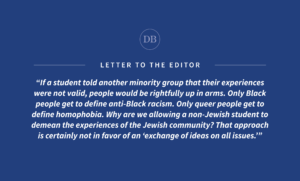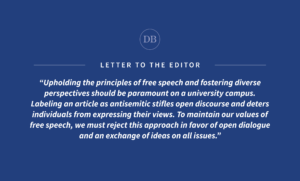Editor’s note: This post was updated April 15 at 8:19 p.m. to remove unsubstantiated conjecture about Ye’s mental health.
Ye’s hate-fueled rampages on X in February reignited debates over whether his behavior stems from deep-seated bigotry or untreated mental illness. Regardless, Ye’s mental state should not be used to excuse his hate.
As a former Ye fan with Jewish ancestry, I’ve witnessed both his artistry and the troubling development of his antisemitic rhetoric.
To confront the complexity of his actions, it is worth considering his history with mental illness.
The rapper, formerly known as Kanye West, was diagnosed with bipolar disorder in 2016 after being hospitalized at the Ronald Reagan UCLA Medical Center, where he was placed on involuntary psychiatric hold for over a week.
On an episode of “The Download” podcast released Feb. 4, Ye claimed he was misdiagnosed with bipolar disorder and instead has autism spectrum disorder – though, notably, the two disorders are not mutually exclusive. He has also remarked that he doesn’t consistently take his medications because he believes it negatively affects his music.
A few days after the interview, Ye – who has made antisemitic comments for years – posted dozens of such statements on X, which have since been deleted. Ye then aired a Super Bowl advertisement for his clothing line, Yeezy, which sold $20 T-shirts printed with swastikas.
For those of us who once admired his artistry, reconciling his past work with his present rhetoric is painful – but I can mourn the visionary who created numerous masterpieces and come to terms with the fact that he is not the person I thought he was.
“Graduation” was the first album I bought on iTunes at 13, and the song “I Wonder” still inspires me. He was the first musician who made me contemplate my own artistic potential through his lyrics and the song’s poignant crescendo.
But as someone with Jewish heritage, I, like many others, am at the receiving end of his hate. His rhetoric is a reminder that the history of Jewish persecution relentlessly continues in America.
My ancestry is embedded with being chased out of stores, homes and countries. My great-grandmother’s family was driven out of its home in Arkansas by the Ku Klux Klan for being Jewish. After burning a cross in their front yard, the KKK promised to burn their house and the clothing store they owned the next day.
My great-grandmother’s family took an overnight train to New York. The next day, the KKK burned their property to the ground. All we have left is this picture.

While acknowledging Ye’s mental health issues and personal stressors is important, he should still be held accountable for his words. It’s unwise to deflect attention from his rhetoric by using his mental illness – or what some fans call his “artistic genius” – as catch-all excuses.
His ex-wife, Kim Kardashian, addressed his mental health publicly in a series of posts on her Instagram Live feed following Ye’s controversial remarks about their past considerations of abortion during a 2020 presidential campaign event. Kardashian attributed his public behavior to the weight of these struggles and his diagnosis. However, bipolar disorder does not inherently cause hateful rhetoric.
While impulsivity can be a symptom of the disorder, hate speech is not. Conflating bigotry with mental illness risks severe stigmatization for those affected by the disorder. This conflation also absolves him of responsibility, dismissing antisemitism as a disease rather than a learned ideology.
Addressing mental health is a personal matter – it is up to Ye and his inner circle to make health care decisions such as taking medications and receiving therapy. As the public, it is up to us to hold him accountable for his words and actions.
A high-profile celebrity like Ye amplifying antisemitic rhetoric can worsen real-life physical violence.
Antisemitic attacks in the United States reached a historic high in 2023 and 2024 with over 10,000 reported incidents. The Anti-Defamation League, a watchdog organization for antisemitism, found 30 antisemitic events directly tied to Ye’s influence in a hate campaign called “Ye is Right.”
Growing up, when I heard stories of Jewish persecution, I saw it as something confined to the past.
I am no longer comforted by that misconception.
Antisemitism is the same as it has always been: conveniently ignoring the reality that Jews – like all ethnicities, religions and cultures – do not behave uniformly or all hold the same beliefs.
Ye is not the outlier American antisemite – he is the legacy of tradition.
This resurgence of antisemitism in America, fueled by extremists like Ye, is manifesting in tangible hatred and violence. It terrifies me to see swaths of adolescents and children watching and listening to Ye – we are witnessing the indoctrination of the next generation’s prejudice against the Jewish people.
Stop streaming his music. Stop drawing attention to his publicity stunts. Start holding those who defend him accountable.
His words have no impact without an audience.
It’s not the time to excuse him with a diagnosis. It’s time to give ourselves a reality check.





Comments are closed.